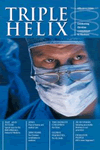As Peter May says in his contribution to this issue which marks our entry to the third millennium, 'there can be little doubt' that the most important 'global figure' of the last two millennia is the 'person of Jesus Christ'.
Longfellow, who is best known for his trilogy 'Christus' reminds us that the unchanging, unifying message of Christ for his followers is that he can make our lives if not sublime, at least rich in service to others. He is 'not for an age, but for all time' to paraphrase Jonson, and we are reminded throughout this issue of this timely issue of the inspirational service of their fellow beings of Christian physicians, surgeons, nurses and others through the ages, not least in harnessing painstaking research, scientific discovery and practical innovation to the prevention, diagnosis and treatment of disease and, when no more can be done, 'comforting always'.
The review of Changing World Unchanging Values challenges the catch-phrase 'change is the only certainty', averring that although we can treat more conditions than ever before, we hardly ever cure anyone. Unarguably, however, what has changed is the sheer pace of change, both in the explosive sequence of advances in medical science and technology, and in the matching escalation in expectations, whether of a perfect baby, and 'instant' ambulance or an uncomplicated operation. Medicated survival and the demoralising demands of draconian 'governance' add their daunting challenges to the dedicated professional worker, even struggling with the factor which never seems to change - inadequate resources. But we are also reminded in this issue of the missionaries of mercy at home and abroad - who have not complained and do not complain about infinitely greater problems and infinitely poorer resources.
Arguably there is one factor in which medical practice which never changes other than in its context and character. Dilemmas are the external litmus test of professionalism. Vain is the person who fondly imagines that such dilemmas of life and death as abortion, surgery on multi-handicapped children, euthanasia (now, alas, semantically corrupted) and the removal of life-support machines in 'brain-dead' patients, can readily be resolved by some clever mathematical formula or by an eager local ethical committee. The very word 'dilemma' denotes two - it may be more - equally valid assumptions which can rarely, if ever, be reconciled to everyone's satisfaction. But if Christian practitioners draw on their 'invisible means of support' they may continue to hope that whatever the third millennium may throw at them, they will be given the strength to cope. Ask not that the cup shall pass from me, but that I shall be given the strength to drink from it.
To echo the sacrament of Holy Communion - and is it too much to hope that a truly ecumenical new millennium will at least allow us all to partake in good faith - as often as we drink this cup, we share afresh the assurance that right will prevail over might, and redeeming love over evil and hatred.
































